イベント&アクティビティ
DIJ Newsletter Winter 2022/23
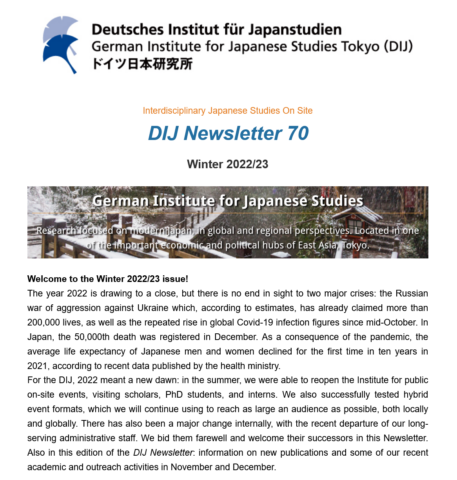
The winter issue of our DIJ Newsletter provides up-to-date insights into our research and publication activities, looks back to recent DIJ events, introduces new staff, and gives updates on our outreach as well as on DIJ alumni actvities. We hope you will enjoy exploring this new edition of the DIJ Newsletter. If you haven’t done so yet, you can subscribe to receive our Newsletters directly to your inbox. The full issues and subscription form are available here.
New issue of Contemporary Japan with special section on 10 years after 3.11
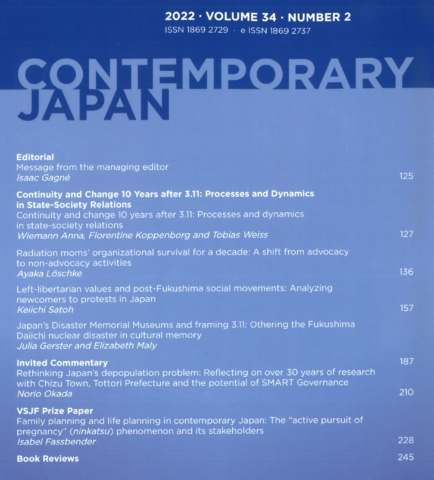
The newest edition of Contemporary Japan (vol. 34, no. 2) features a special section on “Continuity and Change 10 Years after 3.11: Processes and Dynamics in State-Society Relations”, guest edited by Anna Wiemann, Florentine Koppenborg and Tobias Weiss; an invited commentary by Norio Okada (Tottori University), who provides a fascinating reflection on his 30 years of fieldwork in so-called “depopulated areas”; and the English translation of the 2022 VSJF Prize Paper by Isabel Fassbender. Rounding out the issue, the book review section covers English and German language publications in the fields of education, family, history, religious studies, and black studies. Please see the full issue here
New edited volume studies German and Japanese approaches to ageing and elderly care in communities
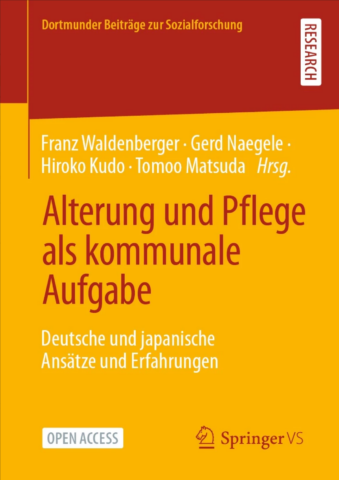
The contributions to the open-access anthology Alterung und Pflege als kommunale Aufgabe: Deutsche und japanische Ansätze und Erfahrungen (in German) describe and analyse the challenges and strategies of ageing and elderly care in Japanese and German communities from a multidisciplinary perspective. Themes include legal frameworks, civil society engagement, caregiver shortages, technology concepts for caregiving, and the impact of the Covid-19 pandemic on the situation of elderly citizens and those in need of care. The comparison of the approaches and experiences of both countries broadens the options for actions and can provide impulses for a reorientation of existing strategies. The book is co-edited by DIJ director Franz Waldenberger, Hiroko Kudo (Chuo University), Tomoo Matsuda (Mitsubishi Research Institute), and Gerhard Naegele (TU Dortmund). It is an outcome of the project Ageing and Elderly Care in German and Japanese Communities whose results were recently presented at an international conference in Tokyo (Details). A Japanese version of the book is currently being prepared.
New open access article studies effects of pandemic on singles’ relationships
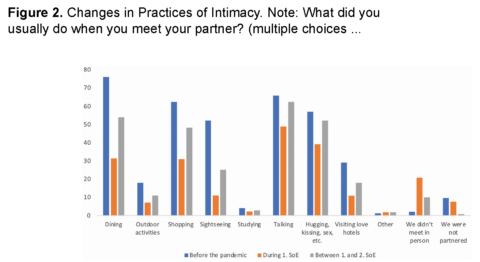
Singles (unmarried individuals) are a growing part of the Japanese population that has not received much attention in the context of the COVID pandemic. A new article by DIJ social scientist Nora Kottmann and Laura Dales (University of Western Australia) addresses the ways in which the pandemic and its associated interventions affect singles’ personal relationships and practices of intimacy as well as perceptions of singlehood and ‘solo activities’. Based on exploratory analyses of data from an online survey conducted in early 2021 , “Doing Intimacy in Pandemic Times: Findings of a Large-Scale Survey Among Singles in Japan” (Social Science Japan Journal, online first) shows that changes of practices of intimacy throughout the pandemic are less dramatic than anticipated. Nevertheless, changes are highly gendered and seem to support media and public discourse on how individuals are coping with the pandemic: an increase in social isolation, distress, acceptance of being single, and ‘solo activities’.
New article by David M. Malitz studies influence of Meiji Constitution on Siamese/Thai political thought
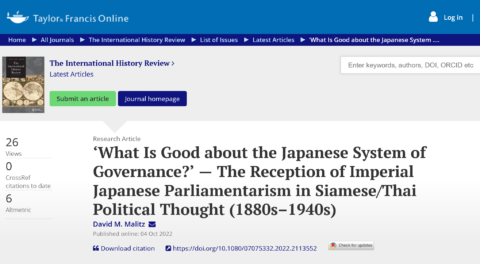
A new research article by DIJ historian David M. Malitz studies how the Meiji Constitution of 1889 and the Japanese Imperial Diet became crucial reference points in the development of Siamese/Thai political ideas from the 1880s to the 1940s. Published in the International History Review (October 2022), “‘What Is Good about the Japanese System of Governance?’ — The Reception of Imperial Japanese Parliamentarism in Siamese/Thai Political Thought (1880s–1940s)” is based on David’s contribution to the Symposium on the Occasion of the 130th Anniversary of the Opening of the Japanese Parliament, which he organized in November 2020 with the DIJ.
New book publication on Japan in transition

DIJ director Franz Waldenberger and deputy director Barbara Holthus have each contributed one chapter to the German-language publication Japan. Ein Land im Umbruch (“Japan. A country in transition”), recently published by Bebra Verlag Berlin. The book’s 17 chapters look at Japan’s past, present, and future to explain the country’s struggle with the challenges of an ageing society, geopolitical conflicts, and the consequences of the Fukushima nuclear disaster. Franz’ chapter “Armer Staat, reiches Land. Japans Staatsverschuldung” (Poor state, rich country. Japan’s national debt) explains why Japan’s record debts is a solution rather than problem. Barbara’s chapter “Covid-Olympia 2020/2021. Japans Wunsch nach Neuerfindung” (Covid Olympics 2020/2021. Japan’s desire for reinvention) studies in how far the Tokyo Olympics have contributed to more sustainability, diversity, and inclusion in Japanese society. The book is co-edited by DIJ alumna Verena Blechinger-Talcott (FU Berlin), David Chiavacci (Zurich), and Wolfgang Schwentker (Osaka). Details here
DIJ Newsletter Autumn 2022
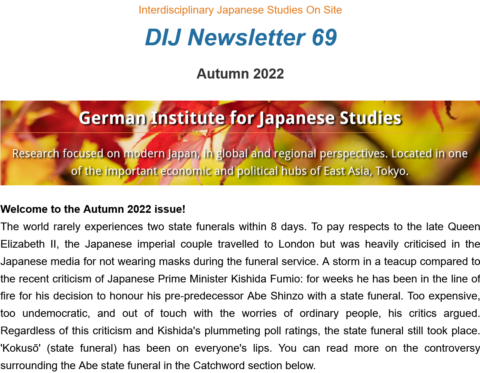
The autumn issue of our DIJ Newsletter provides up-to-date insights into our research and publication activities, recent and upcoming events, news from the institute, a new article in our Catchword series (kokusō), updates on our outreach activities, and DIJ alumni news. We hope you will enjoy exploring this new edition of the DIJ Newsletter. If you haven’t done so yet, you can subscribe to receive our Newsletters directly to your inbox. The full issues and subscription form are available here.
New Working Paper studies East and Southeast Asian perspectives on Russia’s war on Ukraine
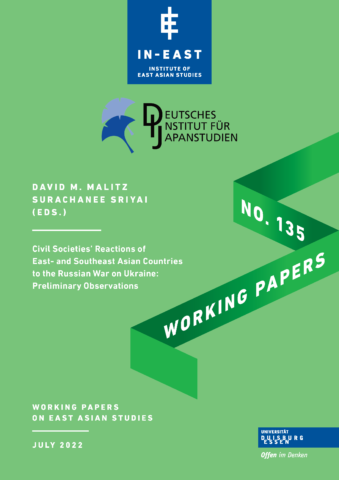
How have societies in East and Southeast Asia reacted to Russia’s invasion of Ukraine? This open access collection of essays provides preliminary answers from Japan, Thailand, the Philippines, South Korea, Indonesia, Malaysia, Myanmar, and ASEAN. Focusing on press and social media, they reveal that the responses to the war are heterogeneous and may not always agree with the foreign policy stances by the respective governments. The essays are published as Working Paper No. 135 in the East Asian Studies series (Institute of East Asian Studies, University of Duisburg-Essen), edited by DIJ’s David M. Malitz and Surachanee Sriyai (Chulalongkorn University, Bangkok). David’s own paper (“Strong Public Support for the Japanese Responses to the Russian Invasion of Ukraine”) outlines the Japanese government’s economic sanctions, delivery of equipment to Ukraine, and acceptance of Ukrainian refugees. Against the background of the strained Japanese-Russian relations, it explains why the public in Japan has been supportive of Ukraine and of these responses by the government.

















 Open Access
Open Access
